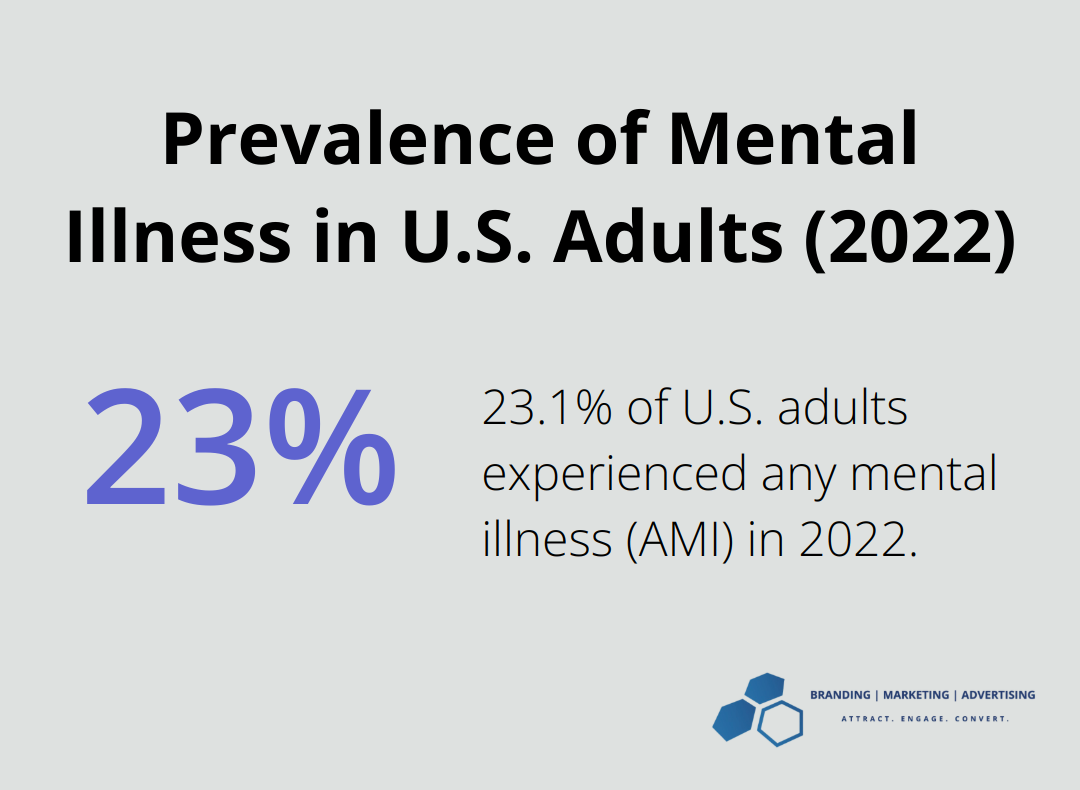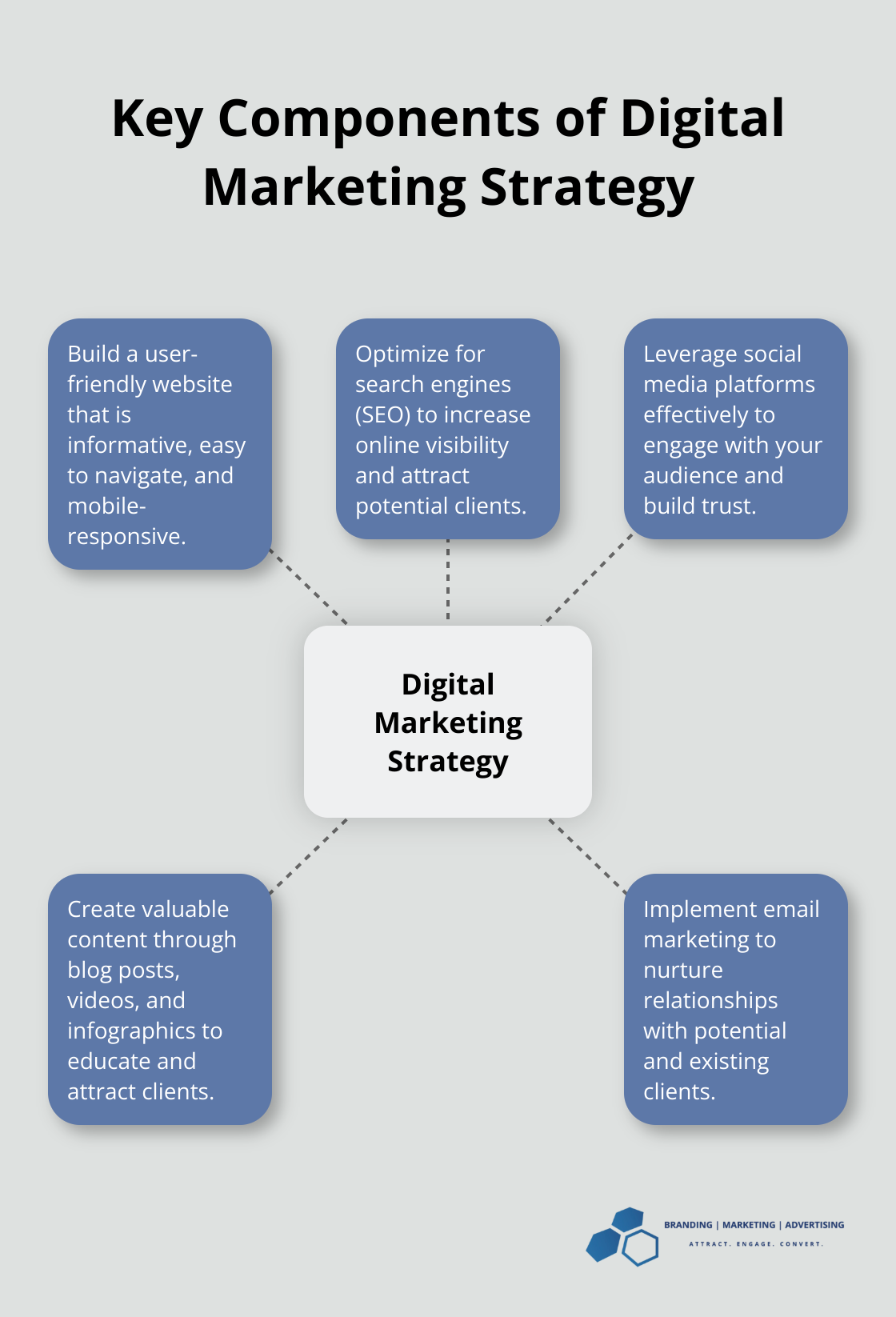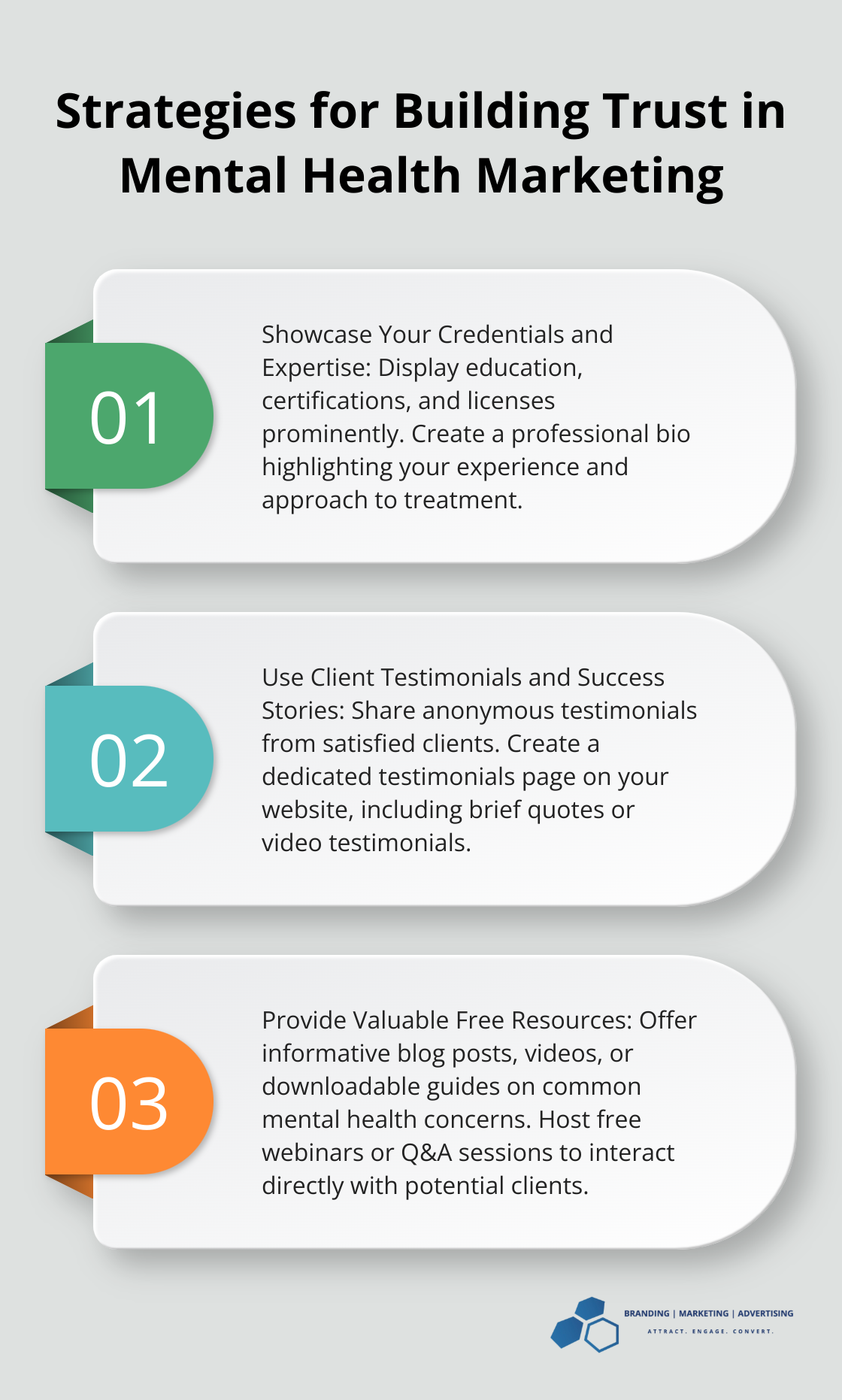How to Market Mental Health Services Effectively
Mental health marketing ideas are essential for practitioners looking to reach those in need of support. At Branding | Marketing | Advertising, we understand the unique challenges of promoting these vital services.
This guide will explore effective strategies to connect with your target audience, build trust, and grow your practice. We’ll cover digital marketing tactics, credibility-building techniques, and ethical considerations specific to the mental health field.
Who Are Your Mental Health Clients
Understanding your target audience forms the foundation of effective mental health marketing. We at Branding | Marketing | Advertising (BMA) know how important this step is for successful outreach. Let’s explore how to identify and connect with those who need your services most.
Pinpoint Specific Mental Health Needs
Start by identifying the primary mental health issues your practice addresses. Do you specialize in anxiety disorders, depression, or addiction treatment? The National Institute of Mental Health reports that 23.1% of U.S. adults experienced any mental illness (AMI) in 2022. This statistic highlights the potential reach for mental health services.

Consider the unique challenges your target audience faces. If you target working professionals, stress management and work-life balance might be key concerns. Address these specific needs in your marketing messages to resonate more deeply with potential clients.
Dig into Demographics and Psychographics
Demographics like age, gender, income, and location provide a foundation for understanding your audience. But don’t stop there. Explore psychographics – the attitudes, interests, and lifestyles of your potential clients.
For example, if you target millennials, consider that this generation may have unique health challenges. A study by the Blue Cross Blue Shield Association found that millennials’ health was at about 95% of their optimal health in 2017.
Use tools like Google Analytics and social media insights to gather this data. These platforms offer valuable information about who interacts with your content and how.
Track Online Behavior and Preferences
In today’s digital age, understanding how your audience behaves online is key. What search terms do they use? Which social media platforms do they prefer? A survey by the Pew Research Center found that 72% of U.S. adults use social media, with usage varying significantly by age group.
Monitor your website analytics to see which pages attract the most traffic. This can indicate what topics or services interest your audience most. Also, pay attention to the devices they use. If a significant portion of your traffic comes from mobile devices, ensure your website is mobile-optimized.
Tailor Your Marketing Approach
With a thorough understanding of your target audience, you can customize your mental health marketing strategies to effectively reach and engage potential clients. This knowledge will inform every aspect of your marketing efforts, from content creation to channel selection.
For instance, if your research shows that your target audience prefers visual content, you might focus on creating informative videos or infographics about mental health topics. If they’re active on specific social media platforms (e.g., Instagram for younger audiences, Facebook for older ones), prioritize your presence on these channels.
Remember, understanding your audience isn’t a one-time task. It’s an ongoing process that requires regular updates and adjustments. As you gather more data and interact with clients, continually refine your audience profile to ensure your marketing efforts remain effective and relevant.
Now that you’ve identified your target audience, it’s time to develop a comprehensive digital marketing strategy that speaks directly to their needs and preferences. Let’s explore how to create a powerful online presence that attracts and engages your ideal mental health clients.
How to Create a Powerful Digital Marketing Strategy
In today’s digital landscape, a strong online presence is essential for mental health practitioners. A well-crafted digital strategy can transform a practice. Let’s explore the key components of an effective digital marketing approach for mental health services.

Build a User-Friendly Website
Your website often serves as the first point of contact for potential clients. It must be informative, easy to navigate, and mobile-responsive. 75% of customers judge a business’s credibility through its website design. Invest in a clean, professional design that reflects your practice’s values and expertise.
Include clear information about your services, qualifications, and treatment approaches. Make it easy for visitors to book appointments or reach out for more information. Add a blog section to share valuable mental health insights and showcase your expertise.
Optimize for Search Engines
Search engine optimization (SEO) increases your online visibility. Focus on relevant keywords that potential clients might use when searching for mental health services (e.g., “anxiety therapist in [your city]” or “depression treatment options”).
Incorporate these keywords naturally into your website content, meta descriptions, and page titles. Regular blog posts on relevant topics can also boost your SEO efforts. A blog increases your chances of ranking higher in search by 434%, significantly increasing their chances of appearing in search results.
Leverage Social Media Effectively
Social media platforms offer excellent opportunities to engage with your audience and build trust. Choose platforms where your target audience is most active. For many mental health practices, Facebook and Instagram are good starting points.
Share a mix of educational content, inspirational quotes, and updates about your practice. Maintain client confidentiality and adhere to ethical guidelines when posting. Engage with followers by responding to comments and messages promptly.
Create Valuable Content
Content marketing educates potential clients and establishes your expertise. Develop a content strategy that addresses common mental health concerns, treatment options, and self-care tips. This provides value to your audience and positions you as a trusted resource.
Create various content types, such as blog posts, videos, and infographics. This increased visibility can lead to more potential clients finding your services.
Implement Email Marketing
Email marketing nurtures relationships with potential and existing clients. Build an email list by offering valuable resources (e.g., e-books or newsletters) in exchange for email addresses. Send regular updates with mental health tips, practice news, and relevant articles.
Personalize your emails based on subscriber preferences and behaviors.
As you implement these digital marketing strategies, you’ll effectively reach and engage your target audience. The next step is to build trust and credibility with potential clients. Let’s explore how to showcase your expertise and establish your practice as a reliable source of mental health support.
How to Build Trust in Mental Health Marketing
Building trust and credibility is essential in mental health marketing. Potential clients must feel confident in your expertise and ability to provide effective care. We at Branding | Marketing | Advertising (BMA) have identified several key strategies to establish trust in your mental health practice.

Showcase Your Credentials and Expertise
Your qualifications form the foundation of trust-building. Display your education, certifications, and licenses prominently on your website and marketing materials. Include any specialized training or areas of expertise that set you apart. For example, if you’re certified in cognitive-behavioral therapy or have extensive experience treating anxiety disorders, make this information clear to potential clients.
Create a professional bio that highlights your experience and approach to treatment. Share your philosophy on mental health care and what clients can expect when working with you. This personal touch helps potential clients connect with you before they reach out.
Demonstrate your expertise by clearly showing the qualifications and certifications of therapists and staff members. Publish only well-researched articles and blog posts to further establish your credibility.
Use Client Testimonials and Success Stories
Nothing builds trust like hearing from satisfied clients. While maintaining confidentiality is important in mental health services, anonymous testimonials can be powerful. A recent study found that 88% of consumers trust online reviews as much as personal recommendations when it comes to local businesses.
Create a dedicated testimonials page on your website. Include brief quotes that highlight specific ways you’ve helped clients overcome challenges or improve their mental health. If possible, use video testimonials for an even stronger impact. (Always obtain proper consent and follow all ethical guidelines when sharing client experiences.)
Partner with Reputable Organizations
Aligning your practice with respected mental health organizations can significantly boost your credibility. Seek out partnerships or memberships with professional associations in your field. Display these affiliations prominently on your website and marketing materials.
Collaborate with local healthcare providers, community organizations, or educational institutions. This expands your network and demonstrates your commitment to the broader mental health community. For example, offer to speak at a local school about teen mental health issues to position yourself as an expert and trusted resource.
Provide Valuable Free Resources
Offering free, high-quality resources is an excellent way to demonstrate your expertise and build trust with potential clients. Create informative blog posts, videos, or downloadable guides that address common mental health concerns. This showcases your knowledge and gives potential clients a taste of your approach and communication style.
Host free webinars or Q&A sessions on topics relevant to your target audience. This allows you to interact directly with potential clients, answer their questions, and build rapport.
Building trust is an ongoing process. Consistently deliver value, maintain transparency, and prioritize ethical practices in all your marketing efforts. These strategies will create a strong foundation of trust that attracts and retains clients for your mental health practice.
Final Thoughts
Effective mental health marketing requires a strategic approach that combines audience understanding, digital presence, and trust-building. Mental health marketing ideas must address specific needs, research demographics, and analyze online behavior to reach those who need services most. A comprehensive digital strategy, including a user-friendly website, SEO optimization, and engaging social media content, connects with potential clients in today’s online landscape.
Building trust and credibility stands paramount in the mental health field. Professionals must showcase credentials, share client testimonials (with proper consent), partner with reputable organizations, and offer valuable free resources. These actions establish a practice as a trusted source of support, attracting new clients and fostering long-term relationships with existing ones.
Branding | Marketing | Advertising specializes in helping mental health professionals develop effective marketing strategies. Our team understands the unique challenges of promoting mental health services and provides tailored solutions to help practices thrive. We combine our expertise with your commitment to mental health care to create a marketing approach that resonates with your target audience and drives meaningful growth for your practice.












